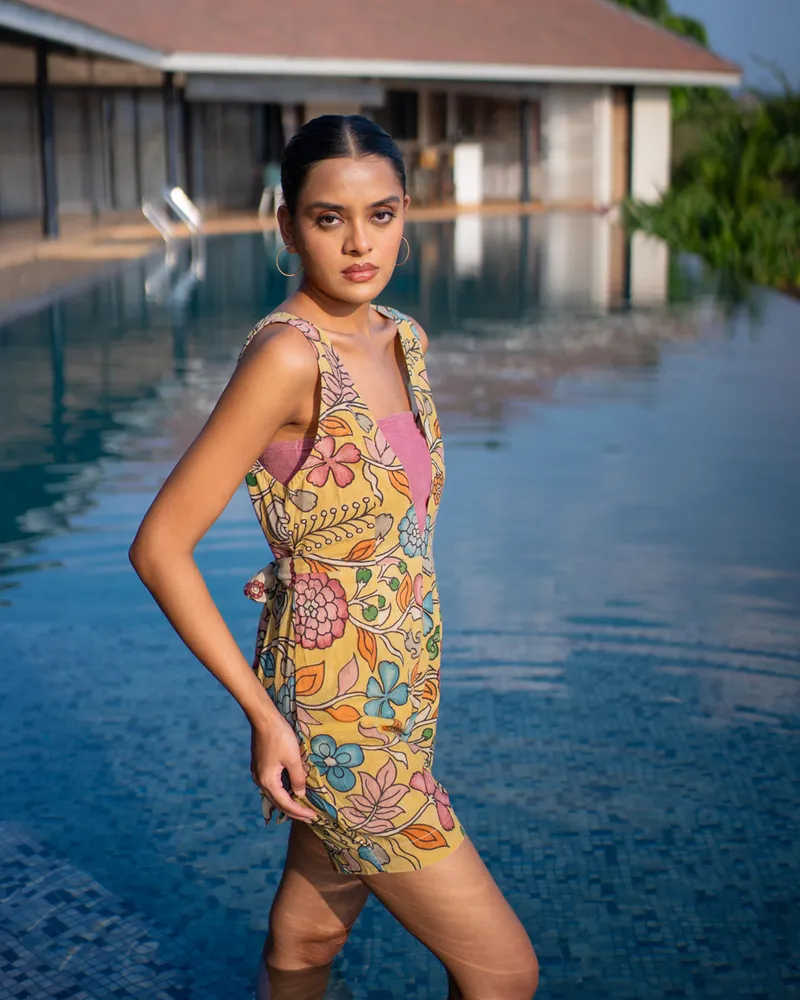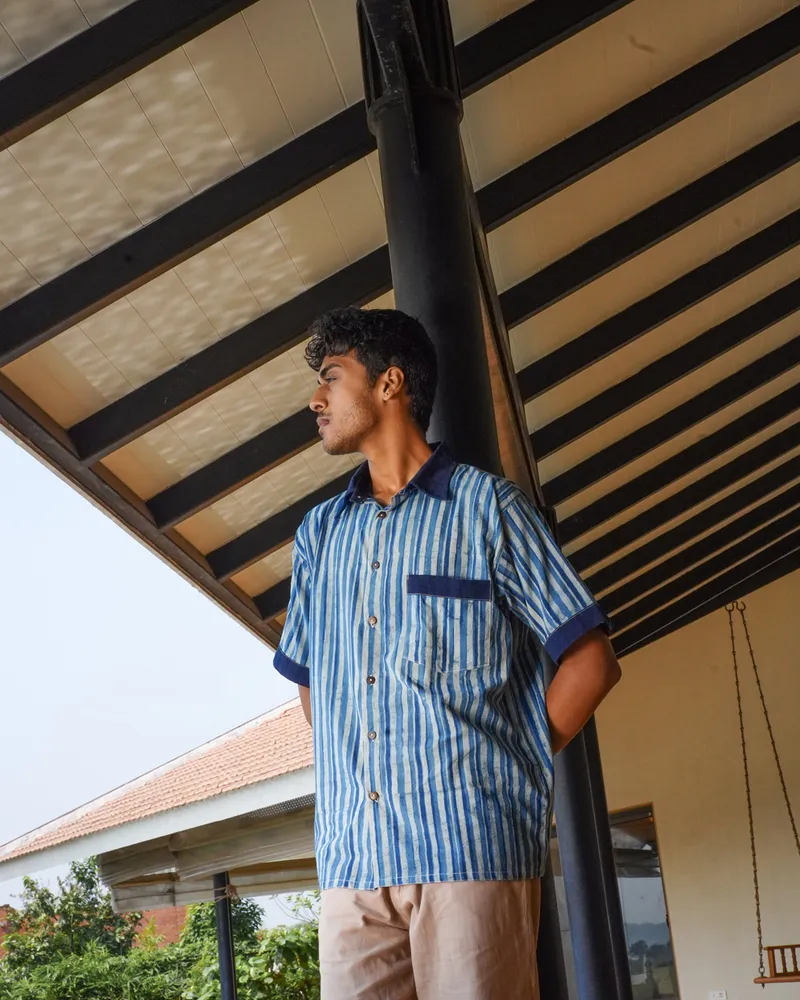How Jiwya is weaving sustainability into India's rich textile heritage
Founded by Adhiraj Shinde and Aishwarya Lahariya, Jiwya is a plant-based, handcrafted luxury fashion brand that works on a soil-to-soil ecosystem, achieving sustainability from start to finish.
Can fashion be sustainable, artisanal, and ethical all at once, or does achieving one mean sacrificing the others?
As conscious consumers demand transparency and responsibility, brands face the challenge of balancing environmental impact, craftsmanship, and fair labour. Is true harmony possible in the fashion industry?
In a world dominated by fast fashion, two textile scientists are on a mission to create what they call—“the cleanest possible textile supply chain”—while taking India’s rich artistic heritage to the world.

Aishwarya learning hand-spinning of yarns
In 2023, Adhiraj Shinde and Aishwarya Lahariya started Jiwya, a plant-based, ethically handcrafted, luxury fashion brand that combines sustainability with centuries-old textile forms.
In 2013, Shinde and Lahariya met as undergraduate students at the Institute of Chemical Technology in Mumbai, where they studied fibre science and textile chemistry. Their shared passion for sustainable textiles took them to the US for their master’s degrees—Lahariya to Cornell and Shinde to North Carolina State University.
“After working in the US for two to three years, we realised that the impact we wanted to make wasn’t possible as employees. What we were doing in terms of introducing sustainable solutions was not enough,” Shinde recalls.
The duo returned to India in 2022 and spent six months in intense research and brainstorming. In 2023, they embarked on an extraordinary journey across the country, traversing 19,000 kms across 19 states. “We met artisans from these states, looking at what arts there were and what variations we could bring into it in terms of sustainability,” he shares.
Their travels yielded relationships with about 150 artisans, now associated with Jiwya. In turn, they collectively employ about 33,000 people, including hand embroiderers, hand printers, block makers, and farmers.
The founders were selective in their approach, focusing on artisans committed to preserving their crafts. "We were looking firstly for the most authentic artisans only because we wanted to promote the ones that wanted to take their art forward, preserve, and nurture their art form," Shinde explains.
Their qualifier? Every artisan had to be at least a state awardee—if not a national or Padma Shri awardee—ensuring government recognition and authentic craftsmanship.
“We looked at the materials they were using as we were focused on plant-based fashion—whether they were cotton, linen, jute, or other fibres. We also evaluated whether they were interested in scaling their business and making money. We divided the artisans into three categories—those who wove fabrics, hand block printers, and hand embroiderers,” he adds.
Shinde says these encounters with master craftspeople revealed the deep cultural roots of Indian textile arts—one of them came from a lineage of 15 generations!
In Gujarat, they met a master of Rogan art, a Padma Shri awardee, who shared his entire process—from pigment making to translating the material onto the fabric and designing.
In West Bengal, they were awestruck by artists practising patua, which fuses paint and song, with the patuas (scroll painters) singing the stories depicted in the paintings.
At the culmination of their journey, Shinde and Lahariya presented 19 stories from 19 states—each highlighting a unique art form—as part of the Jiwya Stories campaign on Instagram. They also decided to use 100 art forms to fashion them into limited edition pieces of apparel and decor, launching the Jiwya website in November 2024.
The soil-to-soil ecosystem

Bagicha summer jumpsuit by Jiwya
Jiwya’s commitment to sustainability can be seen from start to finish—what the founders call a “soil-to-soil” ecosystem.
"When we say we are 100% plant-based, it starts from the fibre sourcing. The fibre has to be natural and includes rain-fed cotton, dry farm cotton, linen, bamboo, banana, hemp, jute, and a lesser-known fibre called nettle from the hilly regions of north India,” Shinde explains.
The colours are equally natural, derived from onion peels, pomegranate peels, turmeric, madder, and natural indigo—all vegetable-based dyes. Even the stitching thread is 100% cotton, a rarity in the market where most brands use polyester-cotton blends.
It also extends to accessories; Jiwya uses coconut shells or reclaimed wood buttons instead of plastic, and strings are upcycled from production waste.
Even the packaging uses recycled paper and unbleached cotton bags, with tags and labels made of pure cotton printed with certified biodegradable ink.
"If you buy a Jiwya product and use it for 30-40 years and you are done with the product, even if you literally throw it in the soil, it's going to biodegrade because everything that is used in the material is 100% coming from the soil," Shinde proudly shares.
Jiwya collaborates with artisans by sourcing raw fabric from them or sending natural fabric for their art to be created on them. These include rogan, kantha, sujani and others. In other instances, Shinde and Lahariya hand-dye the yarn in their own facility in Nasik and send it to the artisans.
What differentiates Jiwya from other brands showcasing Indian crafts is their contemporary approach to design. While traditional Indian textiles are often associated with ethnic wear, the co-founders saw an opportunity to present these heritage art forms in modern, globally appealing designs.
"A lot of our American friends wanted to wear it, but what was available were kurtis, lehengas, and dupattas that they could not wear on a day-to-day basis," he explains. "What we thought was, why not present heritage Indian forms to a global audience in a palette they could wear on a day-to-day basis."
Lahariya—a scientist and a designer—leads this process, creating timeless pieces that transcend trends. "Most of our designs are timeless, simple, yet chic and elegant. Each design incorporates at least two geographically distinct Indian art forms, making every piece unique. We call them wearable artwork—something you invest in. They are priced higher because everything is made by hand, right from the yarn hand-dyes to the art,” Shinde elaborates.
Finding a luxury niche

Neel striped shirt by Jiwya
Jiwya’s business model is built on exclusivity—they produce no more than 20-25 pieces of any design. Though they've only been in the market for a few months, they are finding success through curated exhibits across India and partnerships with conscious marketplaces globally. The apparel and home decor are also available on its own website.
“We invite HNIs, art collectors, architects, photographers, and art enthusiasts to our curated exhibits, especially those who have a sense of style and want to buy sustainable clothing. Every Jiwya product has a story behind it; they see the pictures and watch the videos—it’s an experiential experience,” Shinde says.
The couple’s ultimate goal is to position the brand in a way that they are accepted by a global audience first and, eventually, the Indian consumers also realise that this is a homegrown luxury brand.
For the artisans, the founders automatically provide a 10-15% higher margin, recognising the additional time required to create their art using hand dyes. The products are priced from Rs 5,500 onwards.
“When we met them, we also noted what each artisan required—simple things like wastewater recycling, infrastructure development, and financial literacy, and so we want to be able to contribute a percentage of sales to give it back. We also employ a lot of women artisans,” Shinde says.
Moving forward, they are looking to launch home furnishings and home decor products.
"Our goal is to become a full-fledged lifestyle brand focused on purely plant-based and sustainable fashion. We want Jiwya to be synonymous with caring for people, the planet, and animals," he concludes.
Edited by Suman Singh






